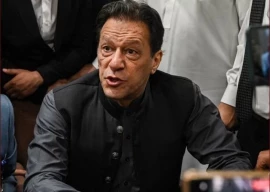
The two-page letter, signed by the premier, highlighted the irregularities going on under the guise of banking reforms, particularly in three banks – National Bank of Pakistan, Habib Bank Limited and United Bank Limited. These banks had given golden handshakes to 20,350 employees at a cost of Rs25.8 billion.

The most glaring irregularity was that these banks had hired 171 executives on contract “at pay packages which, to say the least, are fabulous”. For instance, NBP retired 7,529 employees at a cost of Rs12.6 billion under the golden handshake scheme, but appointed 20 executives on contract including the two who had retired from the bank.
The premier cited a unique case of an executive who took optional retirement while being posted in Pakistan and was re-hired in the United States on contract for three years with a salary many times more than that he was getting in Pakistan.
Fifteen years down the line, Sharif is again the prime minister and NBP is facing the same old issues, which have further aggravated. The bank is sustaining heavy losses due to fraud both in overseas and domestic branches, preference given to contractual employees and the institution’s use for political purposes.
Its management is facing the challenge of improving the human resource and how to strike a balance between contractual and regular officers and executives. The new management is in favour of contractual staff and, in the process, recruitment procedures are compromised.
Regular employees feel that they have been sidelined and their career’s progress has been blocked with increasing preference given to contractual employees. In the presence of regular executive vice presidents who are waiting for promotions, the management is hiring senior executive vice presidents on contract.
Irrespective of what the bank management says, at present the contractual employees are calling the shots and receiving salaries that are in some cases more than double the pay regular employees are getting.
Salary ranges
According to a February 3, 2014 circular of the bank about revision in salary ranges, a senior executive vice president (SEVP) working on contract is drawing a maximum pay of Rs912,000, which is Rs247,000 or 37% higher than the maximum remuneration a regular SEVP is getting.

A contractual executive vice president (EVP) is taking a maximum of Rs600,500, which is 51% higher than the salary of a regular EVP. A senior vice president (SVP) working on contract is getting Rs395,000, which is two-thirds more than the pay of a regular SVP.
A contractual vice president (VP) is receiving a salary up to Rs265,500, which is 84% higher than the pay of a regular VP. Similarly, an assistant vice president (AVP) is receiving Rs171,000, which is 103% more than the salary of a regular AVP.
This has led to the creation of different lobby groups in the workforce and officers are giving more time to internal politics than doing their official job, say people who are aware of the developments.
The NBP board is also being used to accommodate the favourites of the Ministry of Finance. During PPP’s tenure, an additional secretary of the Ministry of Finance, who was a board member, got about Rs10 million by arranging board meetings, most of which were purposeless, according to a former central banker.
Even the present PML-N government has appointed people on the bank’s board just to allow them to enjoy the benefits including the fee of Rs95,000 for a board meeting.
In the words of a former State Bank of Pakistan governor, in present circumstances, NBP could not be called a state institution. It was thriving on the back of government deposits.
Owing to years of negligence, the bank is sustaining huge losses. After suffering a loss of over Rs13 billion in Bangladesh, many corruption and embezzlement cases are being reported in Pakistan branches.
The bank’s recoveries are going down and the management is now bringing in officials of the Federal Investigation Agency (FIA) and other banks to improve recoveries.
It is in no mood to punish those who are responsible for causing the losses. Instead, the people accused of causing harm to the bank have got contract extensions.
In this regard, the case of Zubair Ahmed is the most glaring as he has been hired as the senior executive vice president after superannuation. The bank’s own disciplinary wing has recommended action against him, as under his supervision NBP Bangladesh sustained losses of over Rs12 billion.
THE WRITER IS A STAFF CORRESPONDENT
Published in The Express Tribune, August 25th, 2014.
Like Business on Facebook, follow @TribuneBiz on Twitter to stay informed and join in the conversation.
COMMENTS (3)
Comments are moderated and generally will be posted if they are on-topic and not abusive.
For more information, please see our Comments FAQ






1724319076-0/Untitled-design-(5)1724319076-0-270x192.webp)


1726732405-0/Express-Tribune-Web-(15)1726732405-0-270x192.webp)

1735025557-0/Untitled-(96)1735025557-0-270x192.webp)











Staff strength has increased from 15000 to 23000+ over the recent times. This dinosaur of a financial Iinstitue needs urgent surgical operation like 3rd party audit and staff rationalization in context of job description and identification of KPIs. Right man for the right job is missing & high cost critical assignments like IT products & logistics are forcasted and implemented blindly. Promotion policy is not goal achievemt based and outdated unrealistic appraisal system with bellcurve is causing extreme demotivation. To preserve this gaint institue from complete failure very urgent steps required.
@MAD: Have you ever met the contractual staff at NBP?? the enjoye salary of contractuals and behave like regular employees
Have you ever met the regular staff at NBP??